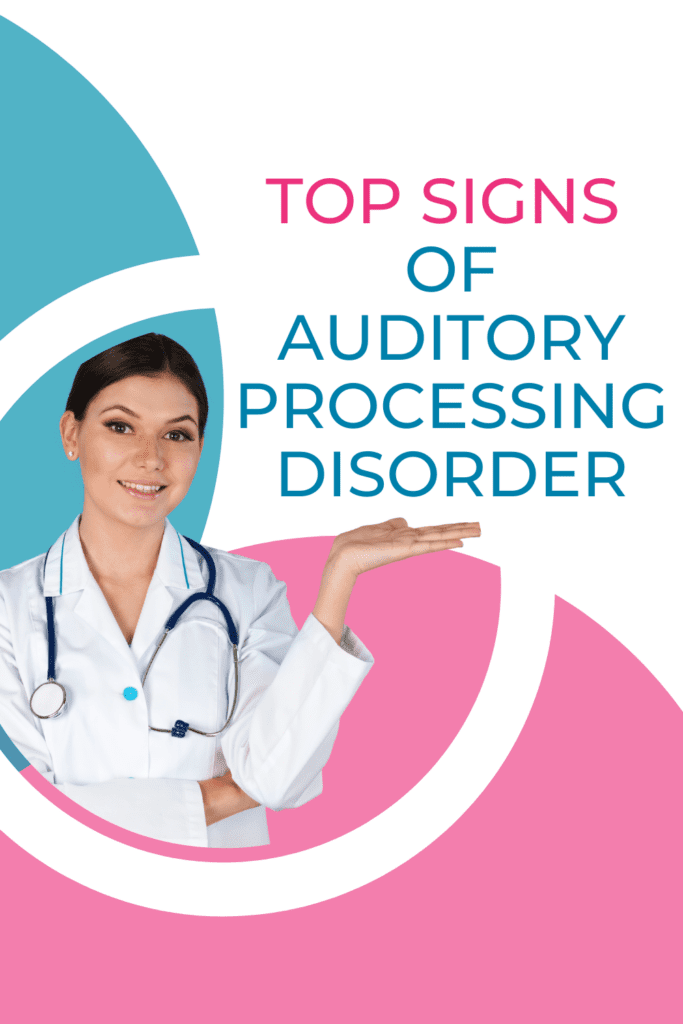“It’s like it goes through one ear and out the other.” How many times have us moms joked about that? If you have a child with ADHD or a learning disability, it can feel like an everyday occurrence … and it’s not so funny after awhile. It can feel downright frustrating for you and your child.
When kids with learning and behaviour issues have a hard time with directions, focusing, filtering distractions or sequences – it is often tied to auditory processing breakdown.
…and as I’ve mentioned previously, auditory processing has nothing to do with how well the ears can hear. Your child can pass a hearing test like nobody’s business and have mild to severe auditory processing challenges.
This is why getting underneath the acronym diagnosis like ADHD, LD etc are so important to moving your child to the next level.
If you’re wondering if poor auditory processing may be one of the root cause factors in your child’s difficulties, look through the list below as a starting point. Obviously, this is simply a starting point and is not diagnostic, but it can certainly give you an idea of where you might want to dig deeper.
Signs of Auditory Processing Disorder
1) General:
- Distracted by background noise
- Blurts out random information
- Poor memory
- Poor ability to accurately retell a story
- Delayed language development
- Poor focus and easily distracted by sounds etc.
- Short attention span due to auditory fatigue (why classroom teaching when teacher explains with oral instructions can result in poor learning and retention)
- Auditory overwhelm from conversation may result in low interest in social interactions
- Distracted or overwhelmed by noisy environments
- Behaviour, focus and academics improves in quiet environments.
2) Memory:
- Appears to have memory issues since they are using so much of their auditory processing skills to follow instructions and learn in the classroom. Much of the learning in classrooms are very demanding of the auditory system which can cause poor focus, inability to process information and result in low quality work, poor engagement and what appears to be memory issues but is in fact inability to even properly process the information.
3) Processing Oral Instructions, Speech & Communication
- Difficulty following a series of instructions such as ‘eat breakfast, brush your teeth, get dressed and grab your backpack’.
- Child says, ‘what’ or ‘huh’ after being addressed (this gives them time to process what was said).
- Mixes up letters or sounds when saying words such as ‘pasghetti’ instead of spaghetti because of poor auditory sequencing of sounds.
- Mumbles, does not use a lot of words when speaking or not much of a ‘talker’
4) Reading
- Does not retain phonics rules
- Needs to sound out same word repeatedly
- Challenge learning letters or sounds
- Poor retrieval of words. Sounds out sight words.
- Behind peers in reading grade levels by up to several years
- Sounds out letters that are not in the word
- Does not show much improvement with various phonics programs
5) Spelling
- Words are not spelled phonetically.
- Spells words differently one day to the next because they cannot store a mental image of the word.
6) Math & Sequences
- Difficulty following math rules, or sequence
- Poor mental math
- Word problems in math are a challenge.
- Challenge to learn sequence of numbers, months etc.
Keep in mind that many children with auditory processing disorder may excel in math or social interaction and struggle with reading or they may read at grade level but struggle with focus and attention and may or may not have poor reading comprehension.
Generally speaking, the more a child struggles with learning and behaviour due to auditory processing difficulties, the more symptoms that will be present.
Dianne Craft outlines the different levels of severity of auditory processing as follows:
Mild
- A child has difficulty understanding a large amount of oral information given at one time but has no trouble with reading.
Moderate
- A child has difficulty processing oral information and some difficulty with reading phonetically.
Severe
- Often presents as Dyslexia. A child has more difficulty with information presented auditorally and also has great difficulty with reading phonetically and remembering sight words.
If you suspect auditory processing may be an underlying factor in your child’s difficulties and want to learn more about how you can correct the root cause so your child can overcome their limitations and reach their full potential – then schedule a free Better Brain Breakthrough session.
